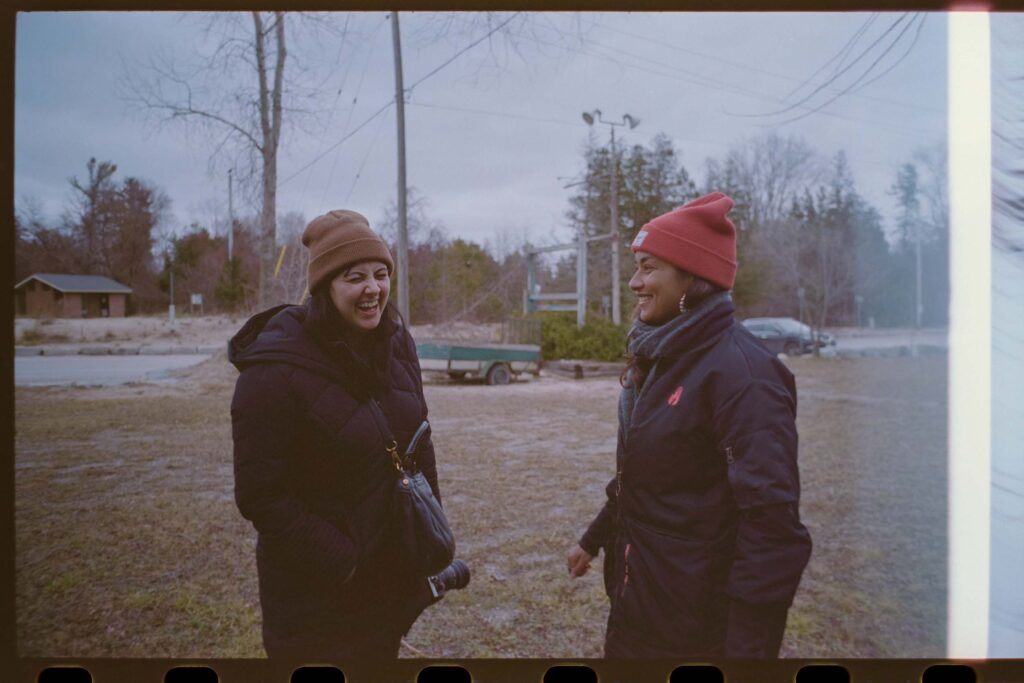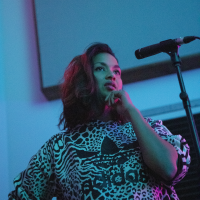On a rainy September night, I climb a dark set of stairs and step onto the bright set of Extraordinary People, the narrative film accompanying Tara Kannangara’s upcoming album of the same name. A tiny crew of seven seem both excited and relaxed as they brainstorm, troubleshoot, and laugh in between takes. It’s Kannangara’s first foray into filmmaking, but inexperience is no barrier on this set; it’s led by director Brittany Farhat, a music industry filmmaker with strong DIY values.
“It was just a lark, like, ‘oh we should make a film,’” Kannangara tells me over Zoom a few months later. “I received a grant to make a series of music videos, but that felt so promotional. We wanted to do something a little more special.”
It’s one of several big challenges Kannangara has tasked herself with recently; since 2019, the Juno-nominated artist has recorded her third album, embarked on her first film, gotten married, started a radio show, and resigned from her teaching position in the University of Toronto jazz department—all while living through the global COVID-19 pandemic.
“So much happened and I changed so much,” she told me in early 2021. “The girl I see from 2019 and 2020 is not the girl (I am) now.”

Kannangara was first drawn to the trumpet and its commanding volume in high school. She went on to study classical trumpet and vocals at the University of Victoria, then jazz and improvised music at the University of Toronto. Kannangara has been weaving her vocal and trumpet melodies into what she calls “groove-based indie jazz” since the release of her first album, Some Version of the Truth, which was nominated for the Vocal Jazz Album of the Year at the 2016 Juno Awards.
In 2016, the singer and band leader was also awarded the Stingray Rising Star award at the Festival International de Jazz de Montréal. Her second album, It’s Not Mine Anymore, was released in 2019. Kannangara has since performed with many jazz artists, including Esperanza Spalding, Elizabeth Shepherd, and the artist featured on the cover of Herizons’ Spring 2018 issue, Lido Pimienta.
Extraordinary People, Kannangara’s third album, was penned in 2019 and will be released alongside its accompanying film next year.
“It’s really good that it took a long time. I think it’s a huge blessing,” Kannangara says. “If you were to ask me questions about how I felt about the music back then, I wouldn’t have given good answers. I wasn’t ready to speak about it.”
“I don’t know what exotic means/ but I think you’re gonna tell me.” – Tara Kannangara in “Name Song”
Extraordinary People includes songs like “Frank,” “Lisa Turtle,” and “Name Song,” that are at turns sardonic, compassionate, and cool—just like Kannangara herself—as they take up issues of belonging, desirability, and the microaggressions people of colour endure while living in a white-dominated culture.
“Name Song” details the frustration Kannangara experiences when white people make comments about her long Sri Lankan name—names that Sri Lankan poet Leah Lakshmi Piepzna-Samarasinha proudly dubs “tonguebreakers” in her 2019 book of poetry.
“I don’t know what exotic means/ but I think you’re gonna tell me,” Kannangara’s lyrics quip over heavy drums in the song’s bridge. “You say you wanna get to know me better/ I get that it’s a lot of letters/ just give it your best shot.”

Tara Kannangara’s (right) upcoming album of the same name. (Photo by Matthew Fong)
These more subtle forms of racism are the kind Kannangara encountered and internalized grow- ing up in a predominantly white community in Chilliwack, B.C.—experiences she unpacks on the new album.
“There’s a lot of stuff about self-criticism and comparison and insecurity and anger (in these songs), and a lot of it had to do with how I compared myself to white standards of success,” she explains. “It’s really apropos right now, but I do remember a time when there was no name for what I was feeling.”
Growing up in the late ’80s and early ’90s, there weren’t even many girls or women of col- our in popular media to connect with—save for the inimitable Lisa Turtle of the teen classic TV series Saved by the Bell. The character’s enviable style and spunk are revered in track “Lisa Turtle.” Kannangara’s narrative extends the story of a one-off episode in which Lisa Turtle hooks up with the show’s popular, blonde-haired, blue-eyed dreamboat, Zack Morris, creating a world within the song in which women of colour are confident, desirable, and get what they want.
“I’m Lisa Turtle/ And I know that you want me,” she sings as a distorted guitar lends an extra edge to the melody. “People say you’re into Kelly/ But I think you know better/ Cuz I’m special.”
The song plays like a love letter to a childhood hero—and it is—but Kannangara also says her relationship to the character was not so simple.
“I had this really deep-seated fear of really being seen, or someone I really connected with being seen in that way, because it’s dangerous when racialized women are put at the forefront. – Tara Kannangara
“I’d never seen a person of colour, a racialized woman, at the forefront,” she recalls. “I had this really deep-seated fear of really being seen, or someone I really connected with being seen in that way, because it’s dangerous when racialized women are put at the forefront. I didn’t get that back then, but I felt it. I don’t wish that fear upon anyone.”
Saturated with subtle and overt messages about white dominance from the media and the world around her, Kannangara became an angsty teen who felt like she didn’t belong. She’s worked hard to look back on her younger self with a compassion and sweetness that really comes through in the song “Frank.” With the benefit of hindsight, Kannangara crafts a dialogue between two Taras so tender, that the emotion catches in my throat on each listen: the first Tara is younger—insecure and vulnerable—and the other older—wise, empathetic, and warm.
The song begins: “Let me be Frank/ Or let me be David/ Each from the womb inoculated/ Hitting home runs with a bat made of steel/ Giving high fives and slapping asses.” It ends with the sage insight, “Swing that wooden bat and hit a triple/ There may be no fireworks/ But little by little/ You’re gonna make it home.”
The film version of Extraordinary People follows a fictionalized version of Kannangara, a young musician who wants to make it in the music industry but slowly begins to question the white and masculine logics that define what success looks like. It’s no wonder such a narrative would be brought to life by Kannangara and her creative partner Brittany Farhat, who left positions at Canadian record labels to create their own independent production company, Brittpaperscissors, in 2017.
Kannangara met Farhat through her bandmates.
“I loved how different (her work) was,” Kannangara recalls. “It felt beautifully fresh, warm but still hard-edged. There’s a lot of texture to what she does, like hards and softs.”
Through the course of their working relationship-turned-friendship, the two have commiserated about the pressures of being a woman in the music industry and dreamed about the possibilities of doing things a different way.

The inciting events of summer 2020 made Kannangara confront the acute connections between her art and politics.
“I was one of those people who was always politically minded, but very guarded about it, then all these horrible things in the world started happening,” she says, referring to the police murder of George Floyd in Minneapolis, which incited global Black Lives Matter demonstrations and calls to defund the police. “All of a sudden I was looking at the music differently, I was looking at the script differently.”
Virtually every corner of our society was pressed to examine its anti-Blackness and institutional racism, and Kannangara was called to action by her friend Modibo Keita, a jazz trombonist and fellow U of T alum who started the #ThisIsArtSchool hashtag and coalition. The hashtag started as a way for students and alumni to share stories of systemic racism, discrimination, and sexual harassment at art schools across Canada.
In July 2020, after hearing the many stories shared through the hashtag, members of the #ThisIsArtSchool coalition issued a call-to-action that was later shared on Instagram. The call detailed a list of short- and long-term action items brought to the University of Toronto jazz administration, involving diversity, crisis, and compassion training; reviews of hiring processes and curriculum; and long-term planning to appoint BIPOC (Black, Indigenous, People of Colour) and LGBTQ+ instructors to full-time and leadership positions.
Kannangara now laughs, a little bitterly, at what she calls her “baby activist” naiveté that assumed that the music school she had been part of as a student and teacher for six years would meet these challenges with an open mind. But after a year-long process she describes as “demoralizing,” Kannangara resigned.
“You do grow, and positive things do happen, but there is a cost,” Kannangara tells me. “The cost is like, my therapy sessions and my day-to-day living, how it’s shifted. Before this, I was pretty blissful, but I don’t have that anymore. I think that actually makes me a better advocate, but it’s something that I will have to manage for years to come.”
The university issued a statement saying that it is working on the concerns raised by Kannangara and her colleagues.
“I just noticed I was so relaxed and creative and happy all of a sudden because I really understood what a safe space was.” – Tara Kannangara
“I think one of the most beautiful things that has come out of this whole experience is the connections I’ve made with people who are not white men,” says Kannangara. “I just noticed I was so relaxed and creative and happy all of a sudden because I really understood what a safe space was. I was actually at my best.”
Working on Extraordinary People, a project with women and people of colour at the helm, has enabled Kannangara to hang on to a piece of that magic. It’s a collaborative effort that’s been magical for Brittany Farhat, too.

“For me, working with Tara was the first time I had another BIPOC artist friend I could relate to and (could) just talk about things I’ve never talked to other artists about before,” says Farhat.
“The first time I saw her perform, I just had a tornado of ideas,” she recalls. “It was very open and collaborative from the beginning. I guess I’ve never had that kind of relationship with anyone else, where there was so much space to be yourself and be creative.”
These days, Kannangara’s biggest goal is to hang on to the sense of play and experimentation she reconnected with during the early days of the pandemic, when music was once again for joy and not merely an output. She’s continuously inspired by her niece and nephew, ages eight and six, who are regular guests on her new radio show, Aunty Cool.
“I play some, like, really heady jazz and they always have something interesting to say,” she says with awe. “What if we all did that? What if we listened to a song and weren’t trying to sound smart talking about it? What if we just noticed it and reacted? I still want to do that; I want to do that now, as an adult.”
Andi Schwartz is a writer and editor with a PhD in gender and women’s studies. Her writing has appeared in Xtra, Herizons, GUTS, Flare, Shameless, and elsewhere . She lives in Toronto with her fur babies, Franny and Zooey . Andi is also the coordinator of the Centre for Feminist Research at York University.

